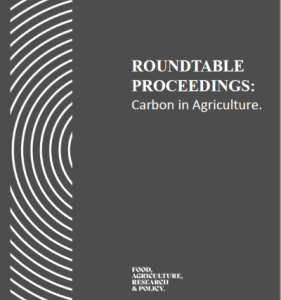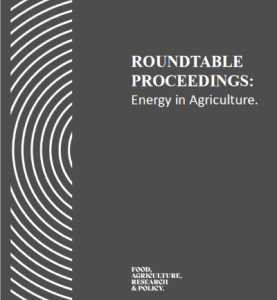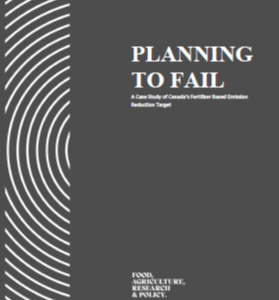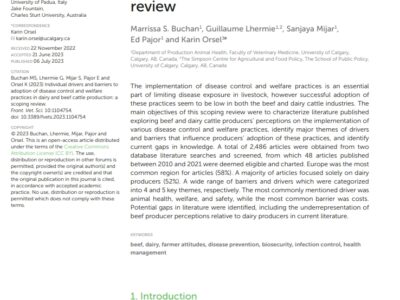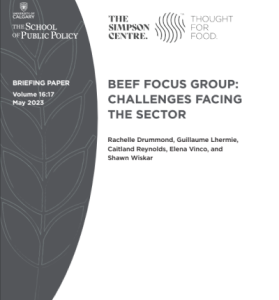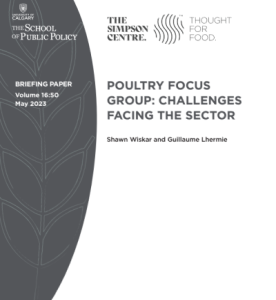Publications
Canada is a major global food exporter, but the projected increase of 1.7 billion in the world’s population by 2050, accompanied by a corresponding increase in food demand, poses a challenge to the country. Its federal policy targets a 30 percent reduction in Nitrous Oxide (N2O) emissions from 2020 levels by 2030, with the ultimate goal of achieving net zero emissions by 2050. Achieving these goals will impact the cost and competitiveness of Canadian agri-food products in the global market. This raises the question of whether feeding Canadians and the growing world population is more important than meeting emission reduction targets, or if both objectives can be achieved simultaneously.
Friday, July 14, 2023
Hanan Ishaque
Alberta’s economy has been based historically on its abundant natural resources, particularly energy and agriculture. The agriculture and energy sectors in Canada are deeply interconnected, since energy is a key input in agricultural production and agriculture provides feedstocks for bioenergy and biofuels. As the world transitions towards a low-carbon economy, both sectors face challenges and opportunities for decarbonization, sustainability and innovation. The Simpson Centre for Food and Agricultural Policy hosted a roundtable event that aimed to promote cross-sectoral collaboration and problem-solving for energy optimization in the agricultural sector. The event showcased the latest research and initiatives for energy production and consumption on Canadian farms and explored optimized energy solutions through collaborations between energy and agriculture. The discussions centered around co-production of agriculture and energy, and featured entrepreneurs, researchers and representatives from government and industry. The ultimate goal was to provide farmers with accessible, relevant, and trustworthy information to support them in their journey towards diversification of their farm operations.
Friday, July 14, 2023
Hanan Ishaque, Amlika Nair
Target setting is an important step in the development of public policy. Targets provides a clear indication of the government’s policy objectives and priorities. They also provide stakeholders clear policy direction, enabling them to plan, monitor, and deliver on policy objectives. To be effective targets need to be well-defined, measurable, and achievable. This report examines the Government of Canada’s fertilizer-based emission reduction target using the criteria for effective targets. This report conducts a review the targets announcement and consultation, Industry repose to the target, and the methodology used to monitor success. This report concludes that while the targets goals of improving efficiency and optimizing nitrogen use are laudable, the measurement use make meeting the target impossible without reductions in nitrogen fertilizer, an action strongly opposed by producers and counter to the targets goal. Lastly the report provides suggestions as to where the methodology could be improved and areas to priorities in the short and long terms to be able to effectively set emission-based targets for 2050.
Friday, July 07, 2023
Joshua Bourassa, Nataliia Arman, Hannan Ishaque, Guillaume Lhermie
The implementation of disease control and welfare practices is an essential part of limiting disease exposure in livestock, however successful adoption of these practices seem to be low in both the beef and dairy cattle industries. The main objectives of this scoping review were to characterize literature published exploring beef and dairy cattle producers’ perceptions on the implementation of various disease control and welfare practices, identify major themes of drivers and barriers that influence producers’ adoption of these practices, and identify current gaps in knowledge. A total of 2,486 articles were obtained from two database literature searches and screened, from which 48 articles published between 2010 and 2021 were deemed eligible and charted. Europe was the most common region for articles (58%). A majority of articles focused solely on dairy producers (52%). A wide range of barriers and drivers which were categorized into 4 and 5 key themes, respectively. The most commonly mentioned driver was animal health, welfare, and safety, while the most common barrier was costs. Potential gaps in literature were identified, including the underrepresentation of beef producer perceptions relative to dairy producers in current literature.
Thursday, July 06, 2023
Marrissa S. Buchan, Guillaume Lhermie, Sanjaya Mijar, Ed Pajor, and Karin Orsel
The Simpson Centre ran a focus group in July 2022 to better understand how the Canadian
cattle industry is handling various challenges, how they interact with policy and their
short-term and long-term priorities. The focus group was made up of industry stakeholders
from various points throughout the supply chain. The discussions were recorded and then
analyzed and coded to determine the key points and develop policy recommendations.
Friday, May 26, 2023
Rachelle Drummond, Guillaume Lhermie, Caitland Reynolds, Elena Vinco, and Shawn Wiskar
The Canadian poultry industry is small but significant; chicken is the most consumed animal meat protein in the country, the consumption of which has increased with population growth and immigration from cultures that favour the meat over beef and pork. Meanwhile, the industry is under pressure to align with sustainability goals, specifically to reduce its greenhouse gas emissions. In 2021, to better understand the industry’s challenges and possible policy solutions to those challenges, the Simpson Centre assembled a focus group of industry stakeholders to discuss their opinions regarding the challenges facing Canadian poultry sector, along with how the sector interacts with policy, and their short-term and long-term priorities.
Thursday, May 11, 2023
Shawn Wiskar and Guillaume Lhermie
